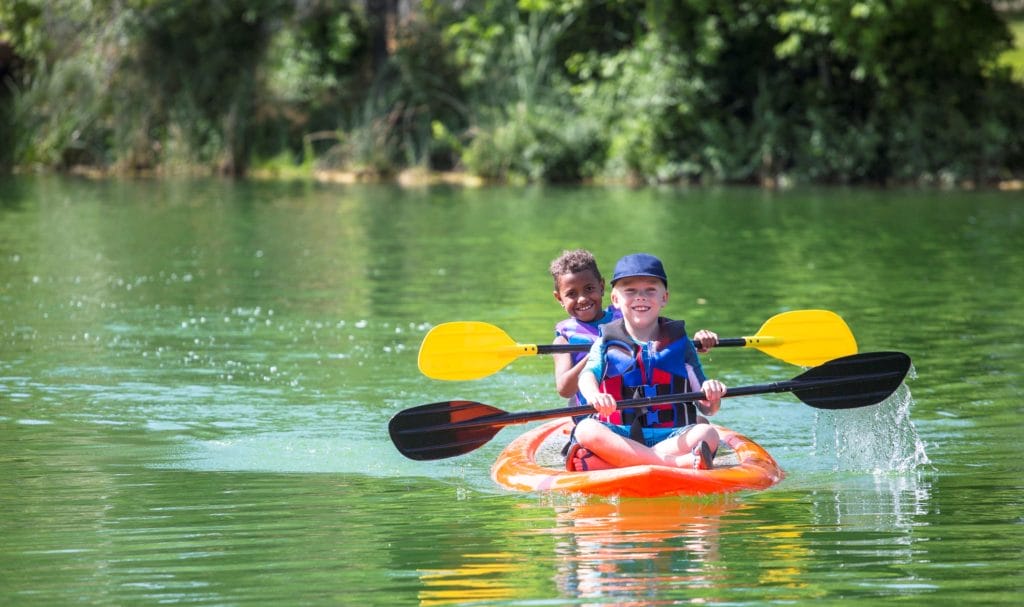
Summer camp is a memorable time, where campers learn skills, gain independence – and make friends for life. But what about if your would-be camper has food allergies? Here’s our guide to the questions to investigate – so your child has a safe and rewarding experience.
One of the guiding principles I adopted while raising my son with food allergies is: It’s not “if” he can do something but “how”. So when his young friends started signing up for summer camp, I began exploring them as well.
The camp directors I spoke with were confident in their ability to manage a child with multiple food allergies. Their policies looked great on paper, but as I dug deeper, I had my doubts.
One camp was staffed with teenagers who had no training on food allergies and anaphylaxis. They also had no way to identify campers who were at risk. The second camp seemed bewildered about allergies beyond peanuts and nuts, and didn’t understand that cross-contamination could be deadly. A third popular camp informed me that camp staff would not administer epinephrine. Rather, they would guide the hand my 5-year-old child to inject his own lifesaving medication, should he need it. No thank you!
Obviously, I chose a different activity for my son that summer. However, I found myself back at one of those camps the following year under different circumstances. The director hired me after a child experienced a severe allergic reaction when he was mistakenly served a nut-laden trail mix.
After this peek behind the scenes, I’m even more convinced. It’s not just what they say, but what you see and even how you feel that will help you to choose the right camp for your child.
Age and Stage Considerations
Here’s how to start the selection process. Decide on the type of camp based on your child’s age, followed by their maturity level and food allergy severity.
3-5 year olds – At this age, a half-day camp may be just right, and can avoid the lunch worries. But snacks and sometimes food crafts may still need to be addressed.
6-9 year olds – Full day camps become a more feasible option at school age. Children should bring their own lunch. Parents should check into any community snacks offered, and work with the camp to incorporate safety precautions for contact activities.
10-12 year olds – Some tweens are ready for an overnight camp, but how do you know? Have they asked about it? Do they sleepover at friends’ houses? If so, then consider the added risks of meals prepared by others, remote locations and off-site excursions.
13 and up – Although teens should take more responsibility for their food allergies, these years are high risk for anaphylaxis. Overnight and special interest camps are more accessible at this age. However, adults still need to be available to support safe choices and respond immediately in case of an allergic reaction.
Questions to Ask Summer Camp
Once you’ve identified a potential camp, contact the director to get a feel for their preparedness. The following questions will get you started.
How does your camp handle food allergies? Ideally, they have a written policy, emergency procedures, and a willingness to address the unique needs of your child. Having nothing in writing is a red flag.
Where are the epinephrine auto-injectors kept? Most kids should self-carry at camp, but it certainly helps if the camp stocks epinephrine and if counselors carry it as well.
Is there a nurse or other medical professional on site? Even if a doctor or nurse is onsite, they may not be immediately available, so also inquire if additional staff are trained to administer epinephrine.
How far is the nearest medical facility? They should know where and how long it would take to get there.
Are campers taken off-site for activities? An adult who is trained to recognize the symptoms of anaphylaxis and administer epinephrine should accompany a young child at all times.
Asking About Training, Food Prep
What kind of food allergy training do counselors and other staff receive? Every employee should know how to avoid, recognize and respond to allergic reactions. Ideally, meals, snacks and food activities are restricted to certain areas and are supervised.
How is food safely prepared for campers with food allergies? Food service personnel must have an in-depth understanding of food allergies and specific procedures for preparing and serving food with safe ingredients and without cross-contamination.
Is the camp accredited? Check with the American Camp Association (ACA). An accredited camp has met more than 300 health and safety standards.
What accommodations have you made in the past? These might include a written food allergy management plan, a trained adult nearby at all times, providing safe snacks, special meal preparation, serving and seating arrangements. Camps are considered public venues and should make reasonable accommodations for food allergies.
Summer Camps That Accommodate
Depending on your child’s age, number and severity of allergies, you may find that the best option is a camp that specializes in accommodating severe allergies. The options below are a few that have an excellent reputation in the food allergy community. [Information is updated for Summer 2024.]
Camp Wingate-Kirkland, located in Yarmouth Port, Massachusetts offers overnight camp for ages 7–16 and a day camp for children ages 4–12. The overnight programs are 3.5 weeks and even 7 weeks in duration. (As well, there’s a 2-week camp for younger, first-timers.) The camp is peanut-, tree nut- and sesame-free and staff can accommodate all food allergies and special dietary needs.
There are nurses on-site, and the camp stocks epinephrine auto-injectors and all staff are trained on their use. Activities with food are only allowed in the dining hall and a camper’s bunk area will be free of their allergens. Learn more here.
On the west coast, Camp Blue Spruce offers a weeklong camp from August 12-17. It’s for kids entering 4th through 8th grades, plus for older teens, there’s Teen eXplorer camp (and a counselors-in-training program). Camp Blue Spruce, located in Oregon, accommodates children with multiple allergies. It serves food that is free of the top nine major food allergens plus gluten.
Many of the staff and volunteers have food allergies themselves. Medical staff are on-site 24 hours per day, and scholarships are available for those who qualify. Learn more here.
Camp TAG: Summer Day Camp
Camp TAG is a specialty day camp designed for children ages 4-13 who have food allergies, FPIES, celiac disease and other special dietary needs and their siblings. For 2024, the camp, operated by the nonprofit FAACT, is offered at two times and locations. Camp TAG in Lebanon, Ohio (near Cincinnati) runs from June 3-7 at YMCA’s Camp Kern. Camp TAG in Nashville, Tennessee runs from June 24-28 at YMCA’s Camp Widjiwagan.
The camp is staffed with licensed nurses and other professionals who are trained in food allergy management. Campers bring their own lunches and medications each day. Certain allergens are restricted from the camp (including peanuts, tree nuts, fish, shellfish, and sesame) and all meals and activities are supervised. Learn more here.
These allergy-friendly camps can be a wonderful way to help kids see that they’re not alone in coping and that their food allergies are just one part of who they are.

Allergic Living columnist Gina Clowes worked for three years as the program director for the CDC’s Voluntary Guidelines for Managing Food Allergies in Schools and Early Care and Education Programs, and is the former national director of training for the nonprofit FARE. Ms. Clowes is a certified master life coach, who specializes in the needs of parents of children with food allergies and founder of AllergyMoms.com, the well-known online support group.
Related Reading:
Food Allergy Campers Find Their Community, Then Pay It Forward
Staying Safe at the Summer Cabin: Tips to Reduce the Risk of an Allergic Reaction
Essential Travel Tips for a Safe and Allergy-Friendly Vacation





